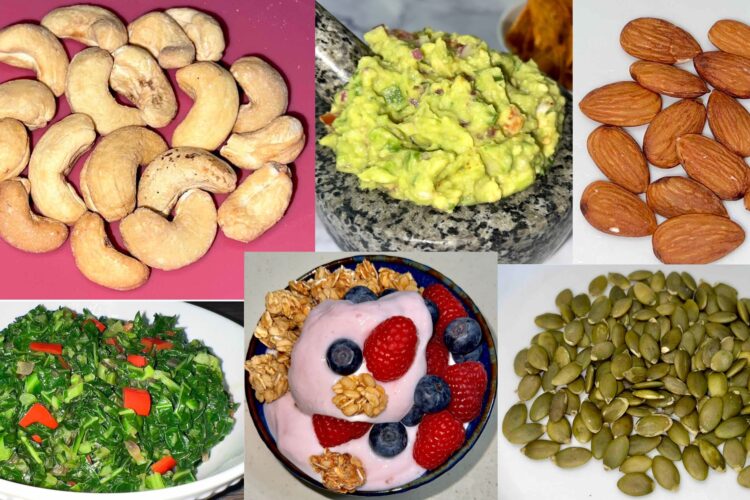Falling asleep and staying asleep often depends on proper nutrient balance. Magnesium-rich foods for natural sleep support calm the nervous system, relax muscles, and regulate melatonin—the hormone that signals your body to rest. A lack of magnesium leads to sleep issues like tossing, waking frequently, and light sleep. Instead of pills, you can improve rest naturally by eating magnesium-rich snacks, especially in the evening. Foods like leafy greens, pumpkin seeds, and dark chocolate promote deep sleep without side effects. This article explores how to use dietary magnesium for better sleep and stronger nighttime recovery.

Why Magnesium Supports Better Sleep
Magnesium helps the brain release GABA, a neurotransmitter that slows nerve activity and induces relaxation. It lowers cortisol, the stress hormone, and balances melatonin cycles. People with low magnesium levels often experience restlessness or insomnia. Unlike synthetic sleep aids, magnesium from food sources works gently and supports long-term health. By eating magnesium-rich foods for natural sleep support, you help your body enter the deeper, restorative phases of sleep where healing and memory processing happen.
Top Magnesium-Rich Foods to Eat for Sleep
Pumpkin Seeds
Just a handful delivers over 35% of your daily magnesium. These tiny seeds also contain tryptophan, which supports melatonin production.
Spinach
This leafy green offers both magnesium and calcium, two minerals that relax muscles and calm brain activity before bed.
Almonds
Besides magnesium, almonds provide healthy fats and protein, helping to stabilize blood sugar levels during sleep.
Avocados
Rich in magnesium, potassium, and B vitamins, avocados regulate nerve signals and aid in nighttime relaxation.
Dark Chocolate
Choose 70% cocoa or higher. It provides magnesium and increases serotonin—a precursor to melatonin.
Bananas
Contain a mix of magnesium, potassium, and tryptophan, perfect for a bedtime snack.
Black Beans
Full of magnesium, fiber, and iron, black beans support digestive rest and balanced sleep cycles.
These magnesium-rich foods for better sleep also offer antioxidants and fiber, boosting overall nighttime health.
:upscale()/2024/07/12/786/n/1922729/tmp_xo7R7b_6b65d8952ee227d1_Magnesium_Foods.jpg)
Best Time to Eat Magnesium Foods for Sleep
Consume magnesium-rich foods for sleep in the evening—1–2 hours before bedtime—for best results. Snack on banana with almond butter or sip a spinach smoothie at dinner. Avoid large, heavy meals late at night. Your body absorbs magnesium more effectively when you pair it with healthy fats or a small amount of carbohydrate. Eating these foods consistently builds up your mineral stores and improves sleep patterns gradually over time. Sleep-friendly nutrition works best when it’s part of your nightly routine.
Other Nutrients That Help Magnesium Work Better
For full effectiveness, pair magnesium-rich foods with nutrients like:
- Vitamin B6 – Helps convert magnesium into a usable form in the brain
- Zinc – Balances magnesium and supports sleep regulation
- Calcium – Works with magnesium to regulate nerve transmission
- Tryptophan – Converts into serotonin and melatonin for relaxation
Foods like eggs, chickpeas, and salmon contain these cofactors. Combine them with magnesium-rich meals for deeper sleep and better nervous system support.
Who Benefits Most From Magnesium-Rich Sleep Foods?
People with insomnia, stress, or anxiety-related sleep issues benefit greatly. Shift workers, students, and older adults often have lower magnesium levels. Athletes and those with restless legs also improve sleep by eating magnesium-rich foods regularly. If you feel tired but wired at night, magnesium might be the missing mineral your body needs to rest naturally.
Conclusion: Eat Your Way to Better Sleep
Magnesium-rich foods for natural sleep support offer a simple, nourishing way to improve your rest. They calm your nerves, support hormone cycles, and help you wake up refreshed. Instead of reaching for sleep aids, build your bedtime plate with nature’s own relaxants. Sleep doesn’t need to be a struggle—sometimes, it starts with the right foods.
